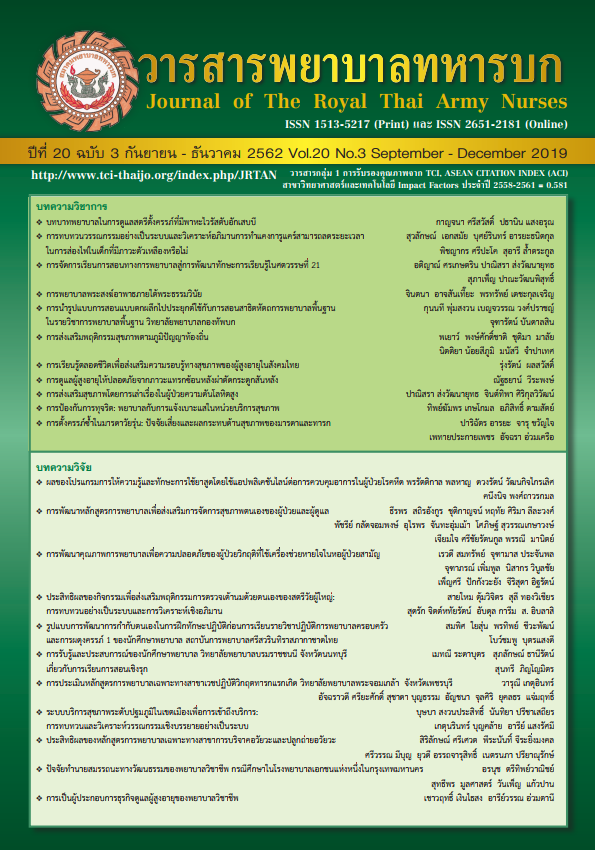Lifelong Learning for Promoting Health Literacy among The Elderly in Thai Society
Abstract
At present, Thai society has already entered the elderly society. Which the Thai society becomes an aging society will inevitably affect the social and economic structure of the country due to decreasing working-age population and increasing elderly population. Causing the budget of the country to be allocated for elderly care because the elderly are the age where the physical health deteriorates. If Thai society wants to reduce the burden on elderly health care to save budget. It is necessary that the relevant government agencies must encourage the elderly in Thai society to become more aware of health literacy so that at least they can take care of themselves initially. The lifelong learning process for the elderly has therefore played an important role in campaigning for the elderly to have continuous learning on related matters for life. Especially about health, which is the most important problem for the elderly in Thai society. In this article, the author introduced concepts related to lifelong learning for the elderly with a focus on health literacy which is an important concept in helping older people to take care of their health at the initial level.
Downloads
References
2. Sirisunhirun S. Guidelines of Community Learning Center For Promoting Lifelong Learning In Elderly. Governance Journal, 5(2): 59-74.; 2016. (in Thai)
3. Buranon A. Guidelines for The Promotion of Lifelong Learning as Need of The Elderly, Elderly Centre Din Dang, Bangkok Metropolitan. Bangkok:Graduate School, Srinakharinwirot University.; 2011. (in Thai)
4. Buathong S., Sapap-ud S. and Jitcharat S. Ageing Related to Reason Method and Needs of Learning. Journal of Education, Silpakorn University, 12(1,2): 6-17.; 2014-2015. (in Thai)
5. Nguyen, C., Leanos, S., Natsuaki, M. N., Rebok, G. W., & Wu, R. Adaptation for Growth Via Learning New Skills as a Means to Long-Term Functional Independence in Older Adulthood: Insights From Emerging Adulthood. NC : Oxford
University Press. (2018).
6. Office of the Education Council. Comparative research report for developing policy on Promoting the learning of the elderly in Thailand. Bangkok: Graphic sweet pepper Co., Ltd.; 2018. (in Thai)
7. Kaewdumkeiang K, Theepejurai N. Health Literacy. Bangkok: New Thammada Printing House.; 2011. (in Thai)
8. Nutbeam, D. Defining and measuring health literacy: What can we learn from literacy studies?. International Journal of Public Health 54(5):303-5.; August 2009.
9. Ministry of Public Health, Department of Health Service Support, Division of Health Education. Health Literacy Evaluation and Promotion. Bangkok: Printery of Division of Health Education.; 2015. (in Thai).
10. Tachavijitjaru C. Srisupornkornkul A., and Changtej S. Selected Factors related with the Health Literacy of Village Health Volunteer. Journal of The Royal Thai Army Nurses, 2018.19 (Supplement). January - April.:320-332.; (in Thai)
11. Tachavijitjaru C. Health Literacy: A key Indicator towards Good Health Behavior and Health Outcomes. Journal of The Royal Thai Army Nurses. 2018. 19 (Supplement). January - April,:1-11.; (in Thai)
12. Manganello, J. A and Davis T. Health Literacy. In Encyclopedia of Adolescence, Roger J.R. Levesque (Eds.). Cham, Switzerland: Springer International Publishing AG. 2018
13. Choeisuwan V. Health Literacy: Concept and Application for Nursing Practice. Royal Thai Navy Medical Journal. 2017. 44(3): 183-197.
14. Kaeodumkoeng K. and Trepetchsriurai N. Health Literacy. Health Education Division Bangkok: Sam Charoen Panit Co., Ltd.; 2011.
15. Sakcharoen P. Key Components in Promoting Lifelong Learning. Journal of Education Studies, 43(2) : 141-156.; 2015. (in Thai)
16. Pongsathonviboon K. Lifelong Learning and Nursing Professional. Journal of The Royal Thai Army Nurses. 2016. 17(3) : 1-9. (in Thai)
17. Sakcharoen P. Adult Learning Theory and Self-Directed Learning Concept: Learning Process for Promoting Lifelong Learning. Journal of The Royal Thai Army Nurses. 2015. 16(1): 8-13.; (in Thai)
18. Ratana-Ubol A. and et al. The Development of The Supportive Guidelines in. Education/Learning Management for Enhancing the Competencies of Older Adults in Thailand (Research Report). Bangkok: Chulalongkorn University.; 2010. (in Thai)
19. Ratana-Ubol A. Education and Lifelong Learning of Thai Senior Citizens (Research Report). Bangkok: Chulalongkorn University.; 2011. (in Thai)
20. Cafiero, M. Nurse practitioners’ knowledge, experience, and intention to use health literacy strategies in clinical practice. Journal of Health Communication, 18 (1): 70-81.; January 2013.
Downloads
Published
How to Cite
Issue
Section
License
บทความหรือข้อคิดเห็นใดใดที่ปรากฏในวารสารพยาบาลทหารบกเป็นวรรณกรรมของผู้เขียน ซึ่งบรรณาธิการหรือสมาคมพยาบาลทหารบก ไม่จำเป็นต้องเห็นด้วย
บทความที่ได้รับการตีพิมพ์เป็นลิขสิทธิ์ของวารสารพยาบาลทหารบก
The ideas and opinions expressed in the Journal of The Royal Thai Army Nurses are those of the authors and not necessarily those
of the editor or Royal Thai Army Nurses Association.






